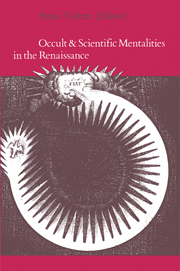Book contents
- Frontmatter
- Contents
- List of contributors
- Editor's preface
- Introduction
- 1 At the crossroads of magic and science: John Dee's Archemastrie
- 2 The occult tradition in the English universities of the Renaissance: a reassessment
- 3 Analogy versus identity: the rejection of occult symbolism, 1580–1680
- 4 Marin Mersenne: Renaissance naturalism and Renaissance magic
- 5 Nature, art, and psyche: Jung, Pauli, and the Kepler–Fludd polemic
- 6 The interpretation of natural signs: Cardano's De subtilitate versus Scaliger's Exercitationes
- 7 Kepler's attitude toward astrology and mysticism
- 8 Kepler's rejection of numerology
- 9 Francis Bacon's biological ideas: a new manuscript source
- 10 Newton and alchemy
- 11 Witchcraft and popular mentality in Lorraine, 1580–1630
- 12 The scientific status of demonology
- 13 “Reason,” “right reason,” and “revelation” in midseventeenth-century England
- Index
4 - Marin Mersenne: Renaissance naturalism and Renaissance magic
Published online by Cambridge University Press: 12 January 2010
- Frontmatter
- Contents
- List of contributors
- Editor's preface
- Introduction
- 1 At the crossroads of magic and science: John Dee's Archemastrie
- 2 The occult tradition in the English universities of the Renaissance: a reassessment
- 3 Analogy versus identity: the rejection of occult symbolism, 1580–1680
- 4 Marin Mersenne: Renaissance naturalism and Renaissance magic
- 5 Nature, art, and psyche: Jung, Pauli, and the Kepler–Fludd polemic
- 6 The interpretation of natural signs: Cardano's De subtilitate versus Scaliger's Exercitationes
- 7 Kepler's attitude toward astrology and mysticism
- 8 Kepler's rejection of numerology
- 9 Francis Bacon's biological ideas: a new manuscript source
- 10 Newton and alchemy
- 11 Witchcraft and popular mentality in Lorraine, 1580–1630
- 12 The scientific status of demonology
- 13 “Reason,” “right reason,” and “revelation” in midseventeenth-century England
- Index
Summary
We now recognize that magic played a much greater role during the Renaissance than modern scholars at first were willing to recognize. Until recent decades, there was a tendency to think of magical thought as a kind of aberration in Western culture, one more appropriate to primitive societies than to the sophisticated European culture, and to feel that those magical ideas which did appear in the West should be referred to apologetically, if at all, as though admitting to a regrettable weakness. Even Lynn Thorndike's monumental History of Magic and the Experimental Sciences, although it gives evidence of a shift of attitude during the years it took him to write the work, for the most part speaks disparagingly about those who paid even lip service to magic. In the Introduction to the first volume Thorndike sounds apologetic about devoting so much effort to such fruitless ideas and justifies them in an antiquarian fashion. By the time of his last volume, however, he is willing to endorse Keynes's description of Newton as the last of the magicians and the first of the moderns. Indeed, in his discussion of Newton he seems almost to suggest that magic may have had some beneficial influences.
More recently, Renaissance magic has received a good deal of attention, spurred by such works as Frances Yates's Giordano Bruno and the Hermetic Tradition and D. P. Walker's Spiritual and Demonic Magic. As a result of this and other work, we now recognize that magic was an important element in Renaissance thought and cannot be ignored.
- Type
- Chapter
- Information
- Occult Scientific Mentalities , pp. 165 - 176Publisher: Cambridge University PressPrint publication year: 1984
- 3
- Cited by



